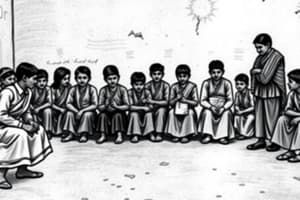Podcast
Questions and Answers
At what age do most children in Britain begin their primary education?
At what age do most children in Britain begin their primary education?
- 7 years old
- 4 years old
- 5 years old (correct)
- 6 years old
What type of school do British children attend after primary school?
What type of school do British children attend after primary school?
- Secondary School (correct)
- College
- University
- Grammar School
Up to what age is education compulsory for all children in England?
Up to what age is education compulsory for all children in England?
- 15
- 16 (correct)
- 18
- 17
What does GCSE stand for in the context of British education?
What does GCSE stand for in the context of British education?
What percentage of students in England typically leave school after their GCSE examinations?
What percentage of students in England typically leave school after their GCSE examinations?
What examinations do students typically take after studying three subjects for two more years beyond GCSEs?
What examinations do students typically take after studying three subjects for two more years beyond GCSEs?
Around what percentage of 18-year-olds in Britain go on to attend university?
Around what percentage of 18-year-olds in Britain go on to attend university?
What is a common feature of British students attending universities?
What is a common feature of British students attending universities?
Besides university, what other option do approximately 20% of 18-year-olds pursue in Britain?
Besides university, what other option do approximately 20% of 18-year-olds pursue in Britain?
What is the primary focus of the A-level examinations taken by students in England?
What is the primary focus of the A-level examinations taken by students in England?
Which of the following statements accurately reflects the progression of students in the British education system?
Which of the following statements accurately reflects the progression of students in the British education system?
What is a key distinction between GCSEs and A-levels in the British education system?
What is a key distinction between GCSEs and A-levels in the British education system?
How does the information provided describe the decision-making process of students in England after completing their GCSEs?
How does the information provided describe the decision-making process of students in England after completing their GCSEs?
Based on the information, what can be inferred about the significance of A-levels for students in England?
Based on the information, what can be inferred about the significance of A-levels for students in England?
What is the typical age range of students who are preparing to take their A-level examinations?
What is the typical age range of students who are preparing to take their A-level examinations?
Considering the paths described, what is a likely reason for the relatively high percentage of British students who leave home to attend university?
Considering the paths described, what is a likely reason for the relatively high percentage of British students who leave home to attend university?
What conclusion can be drawn about the British education system's approach to higher education from the options presented to 18-year-olds?
What conclusion can be drawn about the British education system's approach to higher education from the options presented to 18-year-olds?
In what way does the structure of the British education system encourage specialization among older students?
In what way does the structure of the British education system encourage specialization among older students?
How might the structure of education in England influence students' readiness for university, considering the options they have at age 16?
How might the structure of education in England influence students' readiness for university, considering the options they have at age 16?
What does the content suggest about the relationship between academic education and practical training in Britain for students aged 16-18?
What does the content suggest about the relationship between academic education and practical training in Britain for students aged 16-18?
Flashcards
Primary School
Primary School
Schools that children typically begin attending around the age of five.
Secondary School
Secondary School
The next stage of education after primary school, usually starting at age 11 and continuing until 16.
GCSE Examinations
GCSE Examinations
A set of standardized exams taken in England at the age of 16.
A-Levels
A-Levels
Signup and view all the flashcards
Study Notes
- Most children in Britain start primary school at age five.
- At age 11, British children move on to secondary school.
- All children remain in secondary school until they are 16 years old.
- At 16, students in England take GCSE (General Certificate of Secondary Education) exams.
- After the GCSE exams, approximately 30% of students leave school.
- The remaining students typically study three subjects for an additional two years.
- These students then take A-levels, or advanced level examinations.
- About 20% of 18-year-olds go to university.
- University students usually leave home to study in a different town or city.
- An additional 20% pursue other forms of education and training.
Studying That Suits You
Use AI to generate personalized quizzes and flashcards to suit your learning preferences.




